
Ibrahim Ahmed Mahmoud al Qosi is a Sudanese militant and paymaster for al-Qaeda. Qosi was held from January 2002 in extrajudicial detention in the United States Guantanamo Bay detainment camps, in Cuba. His Guantanamo Internment Serial Number is 54.
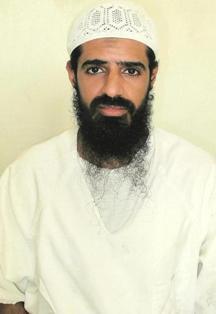
Walid Muhammad Salih bin Mubarak bin Attash is a Yemeni prisoner held at the United States' Guantanamo Bay detention camp under terrorism-related charges and is suspected of playing a key role in the early stages of the 9/11 attacks. The Office of the Director of National Intelligence has described him as a "scion of a terrorist family". American prosecutors at the Guantanamo military commissions allege that he helped in the preparation of the 1998 East Africa Embassy bombings and the USS Cole bombing and acted as a bodyguard to Osama bin Laden, gaining himself the reputation of an "errand boy". He is formally charged with selecting and helping to train several of the hijackers of the September 11 attacks. On 31 July 2024, Attash agreed to plead guilty to avoid the death penalty. His plea deal was revoked by Secretary of Defense Lloyd Austin two days later.

Abd al-Rahim Hussein Muhammed Abdu al-Nashiri is a Saudi Arabian citizen alleged to be the mastermind of the bombing of USS Cole and other maritime attacks. He is alleged to have headed al-Qaeda operations in the Persian Gulf and the Gulf states prior to his capture in November 2002 by the CIA's Special Activities Division.
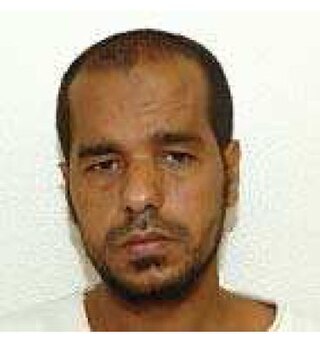
Salim Ahmed Salim Hamdan is a Yemeni man, captured during the invasion of Afghanistan, declared by the United States government to be an illegal enemy combatant and held as a detainee at Guantanamo Bay from 2002 to November 2008. He admits to being Osama bin Laden's personal driver and said he needed the money.
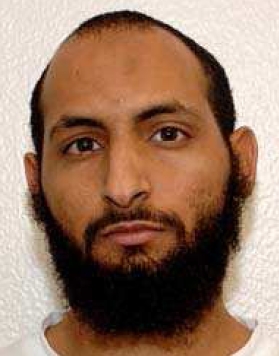
Mahmoud Abd Al Aziz Abd Al Mujahid is a Yemeni citizen who was held in extrajudicial detention in the United States Guantanamo Bay detainment camp, in Cuba, for over fourteen and a half years, from January 11, 2002, to August 15, 2016. His Guantanamo Internment Serial Number is 31. Joint Task Force Guantanamo analysts report that he was born in August 1980, in Taiz, Yemen.

Nashwan Abdulrazaq Abdulbaqi al-Tamir, better known as Abd al-Hadi al-Iraqi is an Iraqi member of Al-Qaeda who is now in United States custody at Guantanamo Bay detention camp in Cuba.
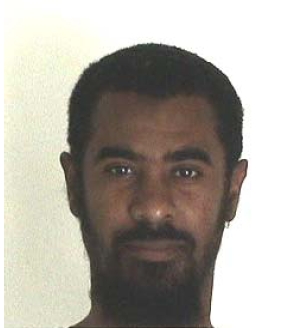
Sulaiman Awath Sulaiman Bin Ageel Al Nahdi is a citizen of Yemen, who held in extrajudicial detention in the United States Guantanamo Bay detainment camps, in Cuba, from May 5, 2002, until November 16, 2015. Al Nahdi's Guantanamo Internment Serial Number is 511. The Department of Defense reports that al Nahdi was born on December 1, 1974, in Mukalla, Yemen.

Ghaleb Nassar Al Bihani is a citizen of Yemen formerly held in the United States Guantanamo Bay detainment camps, in Cuba. The Department of Defense estimate that he was born in 1979, in Tabuk, Saudi Arabia.

Muhammad Ahmad Abdallah al-Ansi is a citizen of Yemen, held in extrajudicial detention in the United States Guantanamo Bay detention camps, in Cuba. His Guantanamo Internee Security Number is 029. American intelligence analysts estimate he was born in 1975, in Sanaa, Yemen. He was cleared for release on December 9, 2016, a recommendation made public on December 22. He was transferred to Oman with nine other men on January 16, 2017.

Mohammed Ahmad Said Al Edah is a citizen of Yemen who was held in the United States' Guantanamo Bay detainment camps, in Cuba, for fourteen and a half years. His Internment Serial Number is 33. Joint Task Force Guantanamo counter-terrorism analysts estimate he was born in 1962, in Hay al-Turbawi Ta'iz, Yemen.

Ha'il Aziz Ahmad Al Maythal is a citizen of Yemen, who was held in extrajudicial detention in the United States Guantanamo Bay detention camp, in Cuba. American intelligence analysts estimate that he was born in 1977, in Zemar, Yemen.
Abdullah Tabarak Ahmad is a citizen of Morocco, who was held in extrajudicial detention in the United States Guantanamo Bay detainment camps, in Cuba.

Ridah Bin Saleh Bin Mabrouk al-Yazidi is a citizen of Tunisia held in extrajudicial detention in the United States Guantanamo Bay detainment camps, in Cuba since the day it opened, on January 11, 2002. Al Yazidi's Guantanamo detainee ID number is 38.

Moath Hamza Ahmed al-Alwi is a citizen of Yemen, held in extrajudicial detention in the United States Guantanamo Bay detainment camps, in Cuba. His detainee ID number is 28. Guantanamo analysts estimated he was born in 1977, in Al Hudaydah, Yemen.
The Military Commissions Act of 2006 mandated that rulings from the Guantanamo military commissions could be appealed to a Court of Military Commission Review, which would sit in Washington D.C.
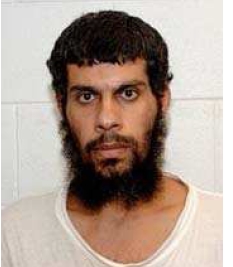
Mohammed Rajab Sadiq Abu Ghanim was held in extrajudicial detention in the United States Guantanamo Bay detention camps, in Cuba, for almost fifteen years. His Guantanamo Internee Security Number is 44. He was eventually transferred to Saudi Arabia

In 2006, after charges were laid against a number of detainees held in the Guantanamo Bay detention camps, a boycott against the judicial hearings was declared by Ali al-Bahlul. The boycott gained momentum in 2008 when more detainees faced Guantanamo military commissions
Sufyian Ibn Muhammad Barhoumi is an Algerian man who was held in extrajudicial detention in the United States Guantanamo Bay detention camps, in Cuba. The Department of Defense reports that he was born on July 28, 1973, in Algiers, Algeria.
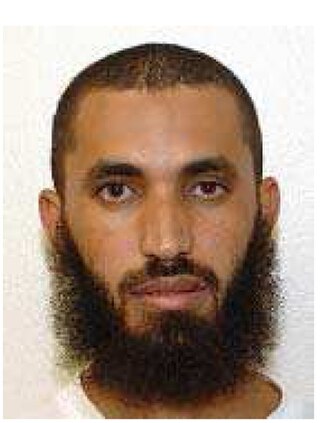
Abdel Malik Ahmed Abdel Wahab Al Rahabi is a citizen of Yemen who was held in extrajudicial detention by the United States from December 2001 to June 22, 2016. He was one of the first twenty captives transferred to the Guantanamo Bay detention camps, in Cuba, on January 11, 2002, and was held there until he was transferred to Montenegro, which granted him political asylum.

















